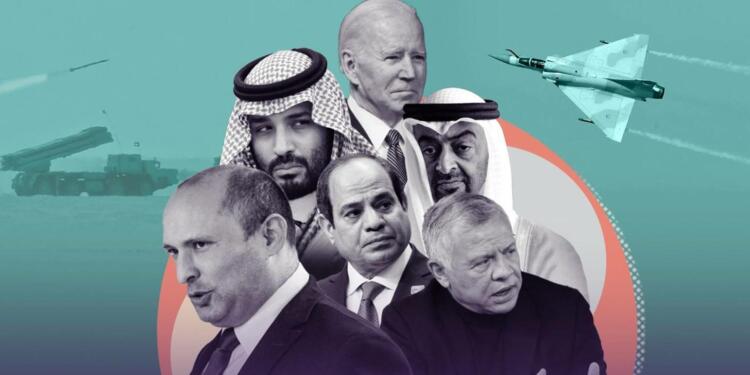It seems as if the three Abrahamic religions are coming together. Trends indicate that they are ready to keep their differences aside, though it may be for a brief period, but they seem to be on talking terms. The crusade rivals are on their way to form a new military alliance called Arab NATO. Let’s see what it is and more importantly, its implications for our beloved Bharat
Arab NATO in the making
In the last few months, news portals have started to push for a new military alliance (Arab NATO) in the Arab world. Apparently, most of them are directly or indirectly controlled by their respective governments. If not governments, they are controlled by ideologies that advocate for keeping the world in a state of conflict. These portals include CNBC, Deutsche Welle, arabnews among others. The increased media coverage indicates that the governments have geared up for the new alliance (Arab NATO).
According to the reports available in the public domain, SAUDI Arabia, UAE, BAHRAIN, QATAR, KUWAIT, OMAN, EGYPT, JORDAN, SUDAN, MOROCCO and ISRAEL will be part of this military alliance. In fact the preparations seems to have kicked off as Israel and US are pushing Arab countries to join Air Defence pact. Most likely, the final pact will be signed in the near future. Hurried response due to Ukraine-Russia conflict will be one of the biggest factors.
They are scared of IRAN
Apparently, all these countries have few common fears. The biggest of them is that of IRAN. At the current juncture of time, it won’t be far-fetched to call IRAN an outlier in the Islamic world. It is a Shia majority nation and cornered by countries under the grip of Saudi Arabia, a Sunni majority superpower of the region. But, Iran has one thing which gives it an edge over all the nations combined.
According to a report by WION news, Iran has by and large same active personnels as UAE, Saudi Arabia, Kuwait, Morocco and Egypt combined. Even in the global firepower index, only Egypt is the country which beats it. Additionally, the nuclear threat from IRAN is also something which is giving sleepless nights to its rivals.
They want to curb radical Islamism
The second biggest fear is the rise of radical Islamism. In few decades, the world won’t be relying on the Arabs for their gas and oil. So, these countries need a new source of income and it can only be generated on the back of investment. Now, keep in mind, most of these countries have autocratic regimes. In spite of that, companies invest in these places because they are provided with special perks. After their oil revenues dry out, these countries won’t be in a position to provide those perks. Ultimately, these countries will need a stable regime and we all know radical Islamism and stability don’t go hand-in-hand.
By taking Israel and the USA on their side, these countries want to import the better ideas of public administration to their polity. Firepower by technologically superior Armed Forces of the US and Israel is just an icing on the cake.
Sorting out internal difference will be the key
But, problems are also there. For one, many countries of the proposed alliance do not recognise Israel. Additionally, on more occasions than one, Saudi and UAE, the cash cows of the proposed group have been found sitting on the opposite ends of spectrum. Moreover, the military alliance may come at the expense of individual Foreign policies of smaller nations. It will be interesting to see how these countries sort out issues built right into their foundational documents.
Frankly, there is a need for Arab countries to unite, it’s another matter that military alliance is not necessary. They should unite to save their economies from collapsing, rather than countering other threats. If they form a military alliance (Arab Nato) with the backing of the US, Russia will naturally take their rivals on its side and the conflict will continue for decades.
India needs to monkey balance
For India, any such alliance will be a tight rope to walk. One one hand, India and Israel are key allies and the civilisational bonhomie between Sanatanis and Jews is a well documented phenomenon. On the other hand, India and Middle East are strategic friends to say the least. There is no inherent bond other than trade between Middle Eastern nations and India. In fact, the civilisational ethos of India and those nations is starkly in contrast to each other.
Though, Arab world has opened its gates for liberalisation of social as well as economic policies in last few years, it will be interesting to see how India balances it.
Support TFI:
Support us to strengthen the ‘Right’ ideology of cultural nationalism by purchasing the best quality garments from TFI-STORE.COM

























